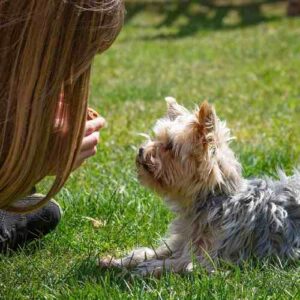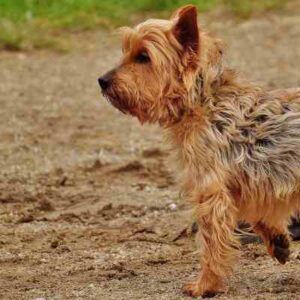Unlock your Yorkie’s full potential with positive reinforcement training – the fun and effective way to strengthen your bond and boost their confidence. Discover the power of positive training today! If you’re a new owner of a Yorkshire Terrier, congratulations! These little dogs are full of personality and charm, and can make wonderful companions. However, like any dog, they require training to become well-behaved and obedient. In this guide, we will explore the basics of training a Yorkie with positive reinforcement.
What is Positive Reinforcement?
Positive reinforcement is a fancy term for a simple and effective concept – rewards! It’s a psychology technique that encourages good behaviour by providing positive consequences, like treats or praise. This makes it more likely that the behaviour will happen again. Think of it as ‘rewards-based training’ – like training a puppy to do tricks with treats. It’s different from punishing bad behaviour, which can create negative associations. Positive reinforcement has been proven to work wonders in animal training, parenting, and education. So, reward the good and watch the magic happen!
Why Use Positive Reinforcement for Yorkies?
Yorkies are intelligent and energetic dogs, and respond well to positive reinforcement training methods that focus on rewarding good behaviour rather than punishing bad behaviour. Positive reinforcement training has several advantages over other methods. Firstly, it is based on rewarding the dog for good behaviour, rather than punishing them for bad behaviour. This approach creates a positive and enjoyable learning environment that builds trust and strengthens the bond between the dog and their owner. Secondly, positive reinforcement training is safe and humane, as it does not rely on physical punishment or fear-based techniques that can harm the dog or damage their relationship with their owner. Thirdly, positive reinforcement training is effective and produces long-lasting results, as the dog learns to associate desirable behaviours with positive outcomes and is motivated to repeat them in the future.
Getting Started with Positive Reinforcement Training
The first step in positive reinforcement training is to identify the behaviour you want to teach your Yorkie. This could be a simple command such as “sit” or “stay”, or a more complex behaviour such as walking on a leash or greeting visitors politely. Once you have identified the behaviour, you need to choose a reward that your Yorkie finds motivating and enjoyable, such as a treat, toy, or verbal praise.
Next, you need to set up a training environment that is free from distractions and conducive to learning. This could be a quiet room in your home or a fenced-in area in your backyard. You should also ensure that you have enough time and patience to devote to the training session, as positive reinforcement training requires consistency and repetition.
To start the training session, you should give your Yorkie a cue to perform the desired behaviour, such as saying “sit” or holding up a treat. When your Yorkie performs the behavior correctly, you should immediately reward them with the chosen reward and praise them with a positive tone of voice. If your dog does not perform the behaviour correctly, you should simply ignore it and try again later, without punishing or scolding them.
As your Yorkie becomes more proficient at the behaviour, you can gradually increase the difficulty level by adding distractions or reducing the frequency of rewards. You should also vary the rewards to keep the training session interesting and prevent your pup from becoming bored or disinterested.
Common Challenges in Positive Reinforcement Training
While positive reinforcement training is generally effective for most dogs, Yorkies can present some unique challenges that require special attention. One common challenge is their high energy level and short attention span, which can make it difficult to keep them focused and engaged during training sessions. To address this, you should keep the training sessions short and frequent, and use highly motivating rewards such as treats or toys.
Another challenge is maintaining consistency in both the training methods and the rewards. In order for the dog to learn and remember the desired behaviour, the rewards must be consistent and immediate. This means that the same reward should be given every time the desired behaviour is performed correctly, and the reward should be given immediately after the behaviour is performed. So, it’s important to have a clear training plan and stick to it. Consistency in training methods, rewards, and expectations is essential for your Yorkie to learn and retain the behaviour.
Distractions are another common challenge in training. Yorkies can be easily distracted by other animals, sounds, and smells, which can make it difficult for them to focus on the training session. To address this challenge, start training in a quiet, distraction-free environment and gradually increase the level of distraction as the dog becomes more proficient at the behaviour. For example, if you’re training your Yorkie to walk on a leash, start in a quiet room and gradually move to a more distracting environment such as a park or street.
Dogs that have been abused or neglected may have fear and anxiety issues that can make positive reinforcement training challenging. Fear and anxiety can cause the dog to become defensive or aggressive, making it difficult to train them. To address this challenge, work with the dog’s natural instincts and gradually desensitize them to the fear or anxiety triggers. This can be done by introducing the Yorkie to the trigger in a safe and controlled environment and rewarding them for calm behaviour.
Positive reinforcement training is not a magic solution for all behaviour issues. Some Yorkies may have inappropriate behaviours, such as aggression or destructive, that require additional training methods. To address this challenge, it is recommended to seek professional help from a qualified dog trainer or behaviourist. They can assess the dog’s behaviour and recommend the appropriate training methods to address the issue.
Positive reinforcement training is a safe, effective, and enjoyable way to teach dogs new behaviours and strengthen the bond between dogs and their human companions. However, like any training method, positive reinforcement training can present some challenges that require special attention. By maintaining consistency, reducing distractions, keeping training sessions short and frequent, addressing fear and anxiety, and seeking professional help when necessary, these challenges can be overcome, and positive reinforcement training can be a rewarding and successful experience for both the Yorkie and their owners.





